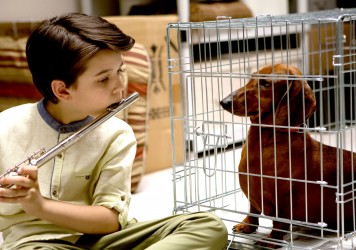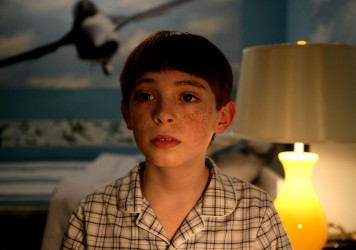Arch misanthropist Todd Solondz tones down the glum in this bitterly funny profile of a thirtysomething living with his folks.
If director Todd Solondz split audiences with Happiness back in 1998 and lost those who had stuck by him with 2004’s Palindromes, those impressed with the promise of Welcome to the Dollhouse may be gratified to learn that his newest film, Dark Horse, represents more than simply a return to form. Solondz’ own pronouncements that Life During Wartime two years ago would be his last film have, thankfully, proved unfulfilled.
For Dark Horse, he has dropped the shock misanthropy that increasingly marked his work for what almost begins as a comedy of manners but becomes more hallucinatory. Solondz takes that recent comic staple of the overgrown stay-at-home – see also the Duplasses’ Jeff Who Lives at Home – and creates what could form a companion piece to Paul Thomas Anderson’s idiosyncratic Adam Sandler vehicle, Punch-Drunk Love (2002).
Abe (Jordan Gelber) is still living with his parents in his mid-30s, in a room full of toy collectibles, when he meets the heavily medicated Miranda (Selma Blair), who also lives at home. He decides to pursue her. “I want to want you,” she tells Abe. “That’s good enough for me,” he says. If this is Judd Apatow territory, theatre actor Gelber plays closer to John C Reilly than Seth Rogen.
Blair may seem perpetually on the verge of tears but she pulls off the film’s best lines amid a fine ensemble cast: Mia Farrow has come out of a semi-retirement to play Abe’s mother, while Christopher Walken, who could still stare down an owl, is Abe’s father – and employer. Donna Murphy as the company secretary stands out, too, playing an increasingly central role when the delusional nature behind Abe’s bluster is revealed.
Opening with a carefully choreographed wedding scene, Dark Horse is set to an unexpectedly upbeat soundtrack, right up to the closing ‘Now is the Time’, from commercial music producer Curtis Marolt.
Published 28 Jun 2012
A tremendous talent, but one to approach with trepidation.
Full of laughs, and plenty of biting home truths.
The opaque finale leaves much to ponder.

By Elena Lazic
Greta Gerwig provides the spark in American nihilist Todd Solondz’s unofficial sequel to Welcome to the Dollhouse.

Director Yorgos Lanthimos proves he’s still got plenty left up his sleeve with this dark dystopic satire.

Todd Solondz family reunion is just like any other: forced, painful and underwhelming.